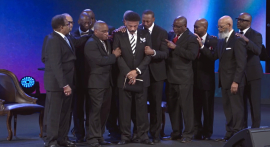
A new Barna report shows that men, especially among millennials and Generation X, are now attending church in greater numbers than women in the U.S., with this trend sharply increasing in the current year.
Data from Barna’s ongoing State of the Church project, conducted in partnership with Gloo, indicates that since the COVID-19 lockdowns, men have been outpacing women significantly in church attendance.
This year, 43% of men reported attending church weekly compared to 36% of women, according to the researchers.
While women’s attendance has remained stable or grown slightly, the increase among men is more pronounced as more Americans return to church.
“Across every generation, women are trailing men in weekly church attendance, especially among Gen X and millennials,” the report notes.
Married fathers with children under 18 are leading in church attendance, whereas single mothers are the least likely group, with only 24% reporting weekly attendance.
The current gap in church attendance between men and women marks the largest ever recorded by Barna since they began tracking this trend decades ago.
Interestingly, the data also show a reversal from the early 2000s, when women far outpaced men in church attendance.
Researchers point to various factors influencing women’s disengagement, including increased work and caregiving burdens, shifting social norms, cultural mismatches, and church leadership issues.
“High-profile scandals involving male church leaders, along with toxic teaching and exclusionary practices, have eroded trust — especially among women,” the researchers highlight.
David Kinnaman, CEO of Barna Group, explained, “When women see repeated examples of moral failure, abuse, or hypocrisy in church leadership, it deepens their disillusionment.”
Many women delaying marriage or choosing to remain single to focus on careers face additional challenges, as some churches tend to cater primarily to nuclear families, causing feelings of isolation.
Researchers also suggest that the decline in women’s church attendance could be linked to a growing disconnect between traditional, hierarchical church structures and the values of younger women, many of whom identify as politically liberal.
“In a culture that increasingly affirms women’s leadership and agency, churches that limit women’s roles may feel out of step, leaving gifted women feeling sidelined,” they say.



















